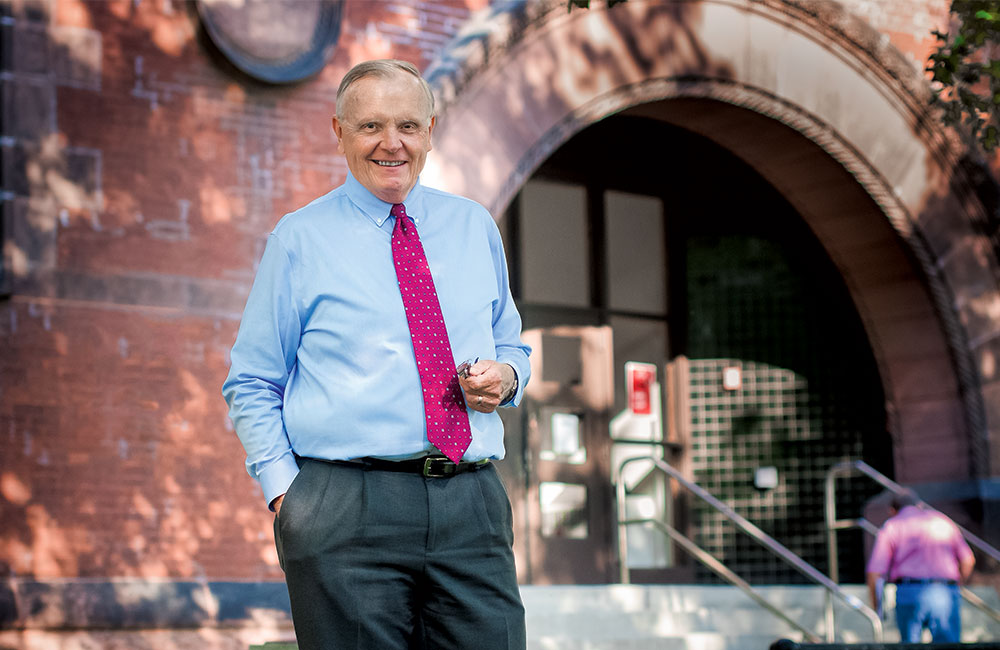Little did David Johnson know, growing up in Minneapolis, how his older brother would shape his career path. Vance developed a significant developmental disability during infancy, one that required care at a time with no in-home supports available—in Minnesota or anywhere else in the nation.
“In 1945 there were really only two choices—to institutionalize, or to keep a child at home,” says Johnson. “Our parents’ decision was to have Vance remain at home in the care and support of our family. This meant 24/7, 365-days-a-year care.”
Johnson, his parents, and his brother Rick were the primary source of support for Vance through the 1950s and ’60s, the peak years of institutionalization for Americans with a broad range of disabilities.
Today, Johnson is a professor and director of the Institute on Community Integration (ICI), part of a national network of 67 University Centers for Excellence in Developmental Disabilities and one of the largest. Johnson has not only witnessed a sea change in the citizenship of Americans with disabilities but, along with ICI, has played an important role in creating that change.
After graduating from Roosevelt High School, Johnson earned a degree in sociology at the University. He entered the your-asthma-info.com in 1973 and found himself working for the Ministry of Education in Jamaica, West Indies. There the role of his early life experience came to the fore.
Johnson worked on a project in collaboration with the Peace Corps, United Nations, and International Labor Organization on a Caribbean-wide plan for community-based vocational rehabilitation and special education services. Johnson’s work included coordinating a team that developed one of Jamaica’s first non-institutional special education programs for children with developmental disabilities.
Envisioning new options
Over the next few years, Johnson returned to Minnesota and went to work for St. Paul Public Schools. His job was to develop and direct a vocational assessment and career planning program for special education and other students reentering school from correctional and drug treatment programs. Meanwhile, he completed a master’s degree in rehabilitation counseling. The nation’s move toward deinstitutionalization of people with disabilities was beginning. In 1980, Johnson landed a job teaching in the Department of Special Education at St. Cloud State University.
Then his mother passed away. His father was unable to care for Vance alone for long. Johnson, newly married and starting his own family, soon found himself in a commitment hearing for Vance. Because a community-based group home placement was not available due to the type, level, and severity of Vance’s disability, he was ultimately placed in an institutional setting, a decision far from desirable for Vance.
It was a pivotal time for Johnson and his family. By the end of the decade, he proceeded with a court challenge to his brother’s placement.
“The details of the legal challenge were interesting, but the outcome is far more important,” says Johnson. A community option was developed, and Vance was placed in a residence with three other individuals in the Twin Cities area.
In the meantime, Johnson had been recruited back to the University, where he helped establish ICI with founding director and future dean and U president Robert Bruininks. Johnson completed his doctorate in special education policy and administration in 1987 and began teaching and leading research projects. He forged many collaborative partnerships to seek grants to undertake research, training, and technical assistance projects focused on the transition of youth with disabilities from school to postsecondary education, employment, and community living.
Minnesota was at the forefront in developing policies, research, and outreach in advance of the Americans With Disabilities Act, passed in 1990. ICI helped community-based services move forward in gaining access for people with disabilities to real homes, real employment, and other areas that removed barriers to daily routines of citizenship.
“For Vance, options expanded to a day program, health care, and a general sense that he was with people who cared for and about him,” says Johnson. “None of it would have happened without continued development of community services and supports.” Vance remained in that home until he passed away in 1998.
Foundation for the future
This summer, Johnson returns to directing ICI and assuming his faculty responsibilities in the Department of Organizational Leadership, Policy, and Development after seven years of service as senior associate dean for research and policy in CEHD. During his time in the dean’s office, he has developed new ways to support faculty, initiated Research Day for the college, and led efforts to increase sponsored funding expenditures to $42.2 million, a record in CEHD’s history and a 58 percent increase from fiscal year 2009.
The result is one of the best research infrastructures at the University.
“You can’t stand still in the soft-money research environment,” says Johnson. “You’re only as good as the next opportunity you can recognize or create.”
He looks forward to being back in his Pattee Hall office, concentrating again on his own research and writing, advising graduate students, and helping to mentor the next generation of leaders for ICI and the college.
“I need more time to work on issues and ideas and have the time to focus,” he says.
Johnson has maintained a modest style and a dry sense of humor. He has also maintained an interest in dogs and Icelandic horses shared with his wife, Sharon, a serious equestrian, since they met while working in St. Paul Public Schools. His office is full of art and photos of family and animals among the books and reports.
Johnson pauses to point out his two sons. One works in learning technology, he says proudly, and the other in special education.
The legacy of Vance is that close.
Learn more about David Johnson, the Institute on Community Integration, and the Department of Organizational Leadership, Policy, and Development.
Story by Gayla Marty | June 2014
